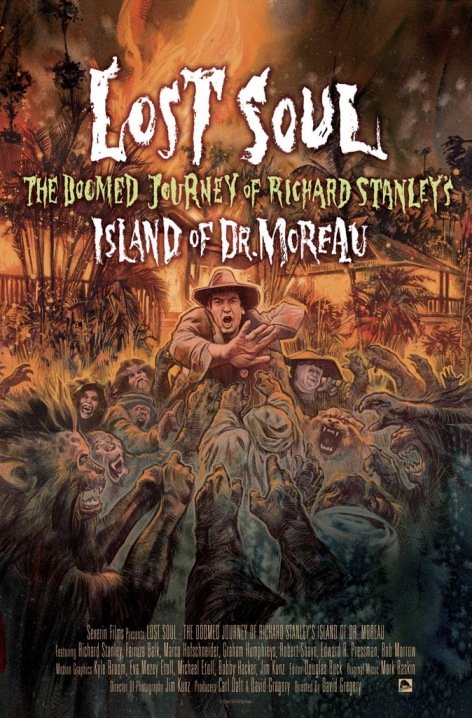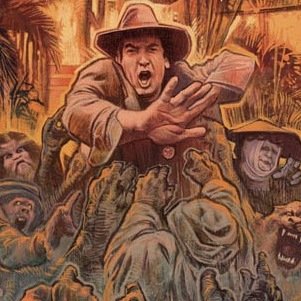LOST SOUL: The Island Of Showbiz Cannibals
Any survey of attempted Hollywood blockbusters from the last twenty years that became bizarro camp/cult artifacts after the fact would have to include the 1996 version of The Island Of Dr. Moreau. This H.G. Wells adaptation was conceived by outsider genre specialist Richard Stanley, who managed to get Hollywood backing and Marlon Brando to play the title role only to see it wrested from his hands and handed over to aging gun-for-hire John Frankenheimer. The combo of combustible egos - superstar-era Val Kilmer was also in the mix - transformed the film into an outlandish fiasco that provided satirical inspiration for everyone from South Park to Dr. Evil. As usual with a camp classic, the story of what happened behind the scenes is more interesting than what actually ended up on the screen - and a new documentary entitled Lost Soul finally unearths the tormented tale of how this film came to be.It all starts with Richard Stanley trying to take his cult movie-level popularity and leverage it into his childhood dream of a Moreau adaptation. The first half of Lost Soul focuses on Stanley's rise and fall as the film's director. This part of the film serves as a cautionary tale about how quickly buzz can curdle into contempt and rejection in Hollywood, with Stanley's eccentricities - he claims he had a warlock weave a spell that helped him seal the deal - becoming his undoing once he has to deal with Hollywood attitudes and egos, with Kilmer being the one who really sticks the knife in.The tale of how Stanley gets fired and replaced is as chilly and grim as an account of a mob hit. Though the documentarians make it clear that Stanley could be his own worst enemy in his refusals to play the game or accommodate his showbiz benefactors, it also makes it clear that his days were numbered as soon as the film became a multi-million dollar project. Tellingly, the notable Hollywood participants - including New Line honcho Bob Shaye and line producer Ted Zinnemann - still speak of Stanley with a barely veiled contempt that insiders reserve those who are not their kind.At this point, Lost Soul shifts gears and becomes a black comedy of Hollywood excess and egotism run amuck. Frankenheimer comes in with old-school bluster in an attempt to restore order but quickly finds himself undone by the perverse whims of Brando, who attempts to subvert the project at every turn with an array of outlandish acting choices and other mind games. Castmates Fairuza Balk and Marco Hofschneider tell fascinating tales of Brando's defiantly impish ways during this half of the film - and there's also some fascinating commentary by minor cast members who provide testimony of what it's like to make money and party while doing very little actual work on the margins of a ru
The combo of combustible egos - superstar-era Val Kilmer was also in the mix - transformed the film into an outlandish fiasco that provided satirical inspiration for everyone from South Park to Dr. Evil. As usual with a camp classic, the story of what happened behind the scenes is more interesting than what actually ended up on the screen - and a new documentary entitled Lost Soul finally unearths the tormented tale of how this film came to be.It all starts with Richard Stanley trying to take his cult movie-level popularity and leverage it into his childhood dream of a Moreau adaptation. The first half of Lost Soul focuses on Stanley's rise and fall as the film's director. This part of the film serves as a cautionary tale about how quickly buzz can curdle into contempt and rejection in Hollywood, with Stanley's eccentricities - he claims he had a warlock weave a spell that helped him seal the deal - becoming his undoing once he has to deal with Hollywood attitudes and egos, with Kilmer being the one who really sticks the knife in.The tale of how Stanley gets fired and replaced is as chilly and grim as an account of a mob hit. Though the documentarians make it clear that Stanley could be his own worst enemy in his refusals to play the game or accommodate his showbiz benefactors, it also makes it clear that his days were numbered as soon as the film became a multi-million dollar project. Tellingly, the notable Hollywood participants - including New Line honcho Bob Shaye and line producer Ted Zinnemann - still speak of Stanley with a barely veiled contempt that insiders reserve those who are not their kind.At this point, Lost Soul shifts gears and becomes a black comedy of Hollywood excess and egotism run amuck. Frankenheimer comes in with old-school bluster in an attempt to restore order but quickly finds himself undone by the perverse whims of Brando, who attempts to subvert the project at every turn with an array of outlandish acting choices and other mind games. Castmates Fairuza Balk and Marco Hofschneider tell fascinating tales of Brando's defiantly impish ways during this half of the film - and there's also some fascinating commentary by minor cast members who provide testimony of what it's like to make money and party while doing very little actual work on the margins of a ru naway production.As the amazing tale winds down, Stanley is ushered by sympathetic crew members back onto set disguised in animal-man makeup to get an extra's-eye view of the chaos his production had become. Like Lost Soul itself, there is a mixture of poignance and dark humor at play here: there's a sense of just desserts for Stanley's former keepers but it also marks a turning point where Stanley turns his back on both Hollywood and the regular world.That's a lot of ground for a documentary to cover - indeed, the involved description omits a lot of details that play out alongside the above storyline - but documentarian David Gregory keeps the pace taut and the narrative absorbing throughout. Film clips, photos and behind-the-scenes footage are woven into the artfully-shot interview footage, giving the viewer's eyes plenty of variation without distracting from the oral history formed by the participants' comments.In short, Lost Soul is a must see for any student of cult movies. It nimbly mixes dark humor and pathos with an effective, often acidic commentary on how rare it is for a filmmaker's vision to escape unscathed from the Hollywood movie mill.
naway production.As the amazing tale winds down, Stanley is ushered by sympathetic crew members back onto set disguised in animal-man makeup to get an extra's-eye view of the chaos his production had become. Like Lost Soul itself, there is a mixture of poignance and dark humor at play here: there's a sense of just desserts for Stanley's former keepers but it also marks a turning point where Stanley turns his back on both Hollywood and the regular world.That's a lot of ground for a documentary to cover - indeed, the involved description omits a lot of details that play out alongside the above storyline - but documentarian David Gregory keeps the pace taut and the narrative absorbing throughout. Film clips, photos and behind-the-scenes footage are woven into the artfully-shot interview footage, giving the viewer's eyes plenty of variation without distracting from the oral history formed by the participants' comments.In short, Lost Soul is a must see for any student of cult movies. It nimbly mixes dark humor and pathos with an effective, often acidic commentary on how rare it is for a filmmaker's vision to escape unscathed from the Hollywood movie mill.
Lost Soul Trailer from Severin Films on Vimeo.


